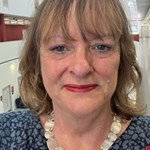
Dr Wendy Martin - Wendy’s research focuses on the social and cultural aspects of ageing. This includes the digital and ageing, the body and embodiment, care and caring, memory and ageing, materiality and rhythms and everyday life. Her research is qualitative and includes the use of visual, material and digital methods in ageing research. Wendy is Convenor of the interdisciplinary Ageing Studies research group within the university.
As the Department Director for Postgraduate Research (PGR), Wendy oversees all the doctoral research in the Department of Health Sciences. She is an experienced supervisor for doctoral researchers and has acted as an internal and external examiner and Chair for PhDs Vivas.
Wendy's research has been supported by a range of funders including the UKRI Ageing Development Award, Economic and Social Research Council (ESRC), Social Sciences and Humanities Research Council of Canada (SSHRC), British Academy, The Leverhulme Trust, The Dunhill Medical Trust and National Institute for Health and Care Research (NIHR). A key dimension of her research is disseminating to a wide and diverse array of audiences and the public engagement of her research can be viewed through photographic exhibitions that have emerged from her research.
Wendy is an elected Executive Board member (Events Chair) of the interdisciplinary International Network of Socio-Gerontechnology and was previously an elected Executive member of the British Society of Gerontology. She is a member of the Editorial Board for the Ageing and Society journal and Electoral College Member and Regional Liaison for Europe for Journal of Global Ageing. She has previously served on the Editorial Boards of the Sociological Research Online and Sociology journals.
Wendy is Co-Editor of the Routledge Handbook of Cultural Gerontology, for which a 2nd edition will be published in 2025, and for the edited Routledge book Socio-gerontechnology: Interdisciplinary Critical Studies of Ageing and Technology.
The focus of her teaching is on the MSc Public Health and Health Promotion and has involved leading both the programme and key modules, such as, inequalities of health, research methods and the dissertation. Wendy has extensive experience in curriculum development and is a Recognised Programme Developer within the university.
Other key roles that Wendy has undertaken within the university include Programme Leader, MSc Public Health and Health Promotion, Recognised Programme Developer that resulted in internal and external validation of new programmes across the university, Chair of Board of Studies, Chair of Exam Boards and Panels, Department Ethics Officer and as Vice Chancellor Representative for Misconduct and Appeals.
Qualifications:
PhD (2008) Department of Sociology, University of Warwick. ESRC funded. Thesis ‘Embodying ‘active’ ageing: health, bodies and emotions in later life’.
MA (with distinction) in Sociological Research in Health Care. University of Warwick (1999). ESRC funded.
BSc (First Class Honours) Sociology and Anthropology. Oxford Brookes University (1997)
Registered General Nurse. St. Mary’s Hospital, London (1986)
Postgraduate Certificate in Academic Practice. University of Reading (2011)